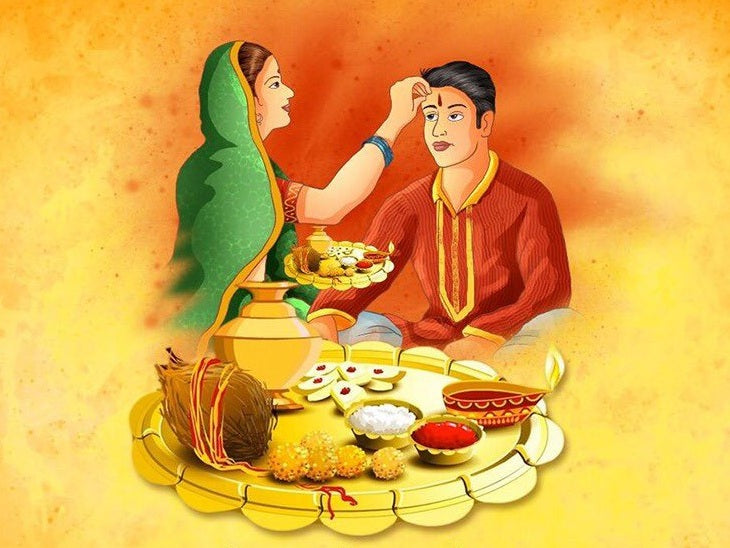Bhai Dooj, a cherished Hindu festival, marks the celebration of the beautiful bond between siblings. Traditionally observed in various regions of India, this festival is known for its heartfelt rituals and the exchange of gifts. Among these gifts, sweets hold a significant place, especially the unique and delightful confections from the vibrant city of Amritsar.
Bhai Dooj Celebrations
Celebrated on the fifth day after Diwali, Bhai Dooj is a day when sisters express their love and affection for their brothers. It involves a heartfelt ceremony where sisters perform aarti, apply tilak (vermilion mark) on their brother’s forehead, and offer prayers for their well-being. In return, brothers shower their sisters with blessings and gifts.
Significance of Novelty Sweets from Amritsar
Th Famous Novelty Sweets Amritsar, a cultural gem in Punjab, is renowned for its culinary delights, especially its diverse range of sweets. The city’s unique confections, such as Pinni, Sohan Halwa, and Gajak, hold a special place in Bhai Dooj celebrations. These sweets are not just delicious treats but also symbols of love and affection, perfect for expressing the warmth of the sibling relationship.
Exploring Amritsar's Novelty Sweets
Pinni
Pinni, a rich Punjabi sweet made of flour, ghee, sugar, and dry fruits, is a staple during Bhai Dooj. Its dense, sweet taste embodies the essence of familial bonds and is often exchanged to convey wishes of prosperity.
Sohan Halwa
Sohan Halwa, a delicacy made from wheat, sugar, and ghee, holds a special place in Amritsari traditions. Its distinct taste and texture make it a perfect gift during the Bhai Dooj celebrations, symbolizing the sweet moments shared between siblings.
Gajak
Gajak, a sweet made from sesame seeds or peanuts and jaggery, is a crunchy, sweet delight popular during the festive season. Its unique texture and taste are ideal for gifting and sharing the joy of the occasion.

Conclusion
Bhai Dooj is not just a festival; it's an embodiment of the beautiful relationship between siblings. The tradition of exchanging sweets, especially those from Amritsar, adds a special sweetness to the celebrations. These unique confections are not merely treats; they symbolize the love, care, and cherished memories shared between brothers and sisters.
Embracing tradition and celebrating Bhai Dooj with the novelty sweets from Amritsar isn’t just about the delectable taste but also about weaving the threads of love and tradition into this beautiful festival.
Frequently Asked Questions
1. What is Bhai Dooj?
Bhai Dooj is a Hindu festival that celebrates the bond between brothers and sisters. It falls on the fifth day after Diwali. Sisters perform rituals and prayers for the well-being of their brothers, who, in turn, offer blessings and gifts.
2. Why are sweets significant during Bhai Dooj?
Sweets symbolize the sweetness and affection in relationships. Exchanging sweets on Bhai Dooj reflects the love and warmth shared between siblings, enhancing the festive spirit.
3. What makes Amritsari sweets unique for Bhai Dooj?
Amritsari sweets, like Pinni, Sohan Halwa, and Gajak, hold cultural significance. They are crafted with traditional recipes, often using indigenous ingredients, and represent the rich culinary heritage of Amritsar.
4. How are Amritsari sweets relevant to Bhai Dooj celebrations?
These sweets from Amritsar hold a special place in Bhai Dooj rituals. They are exchanged as tokens of love, blessings, and good wishes, adding a traditional and flavorsome touch to the celebrations.
5. Can these sweets be shipped internationally for Bhai Dooj celebrations?
Some platforms and local stores might offer international shipping for these sweets. It's advisable to check with specific vendors or online stores that specialize in delivering Indian traditional sweets globally.
6. Are there specific rituals involving Amritsari sweets during Bhai Dooj?
While there might not be specific rituals exclusively for these sweets, they are often exchanged as gifts during the Bhai Dooj ceremonies, symbolizing the love and affection between siblings.
7. What dietary restrictions or allergies should be considered when gifting these sweets?
It's essential to consider any allergies or dietary restrictions the recipients may have. Many traditional Indian sweets contain ingredients like nuts, dairy, or gluten, so ensuring the recipient's dietary preferences is thoughtful when gifting these treats.
8. Are there variations or different types of Amritsari sweets for Bhai Dooj?
Yes, Amritsar offers a diverse range of sweets. Alongside Pinni, Sohan Halwa, and Gajak, there are other traditional sweets like Balushahi, Jalebi, and more, each with its unique taste and significance in local traditions.
9. How do these sweets reflect the essence of Bhai Dooj celebrations?
The exchange of these sweets signifies the exchange of love, blessings, and the strengthening of the bond between siblings, encapsulating the essence of Bhai Dooj—the celebration of sibling love and affection.
10. Can these sweets be enjoyed beyond Bhai Dooj celebrations?
Absolutely! Amritsari sweets are delights that can be relished throughout the year, serving as reminders of familial ties and cherished traditions, not just limited to festive occasions.

